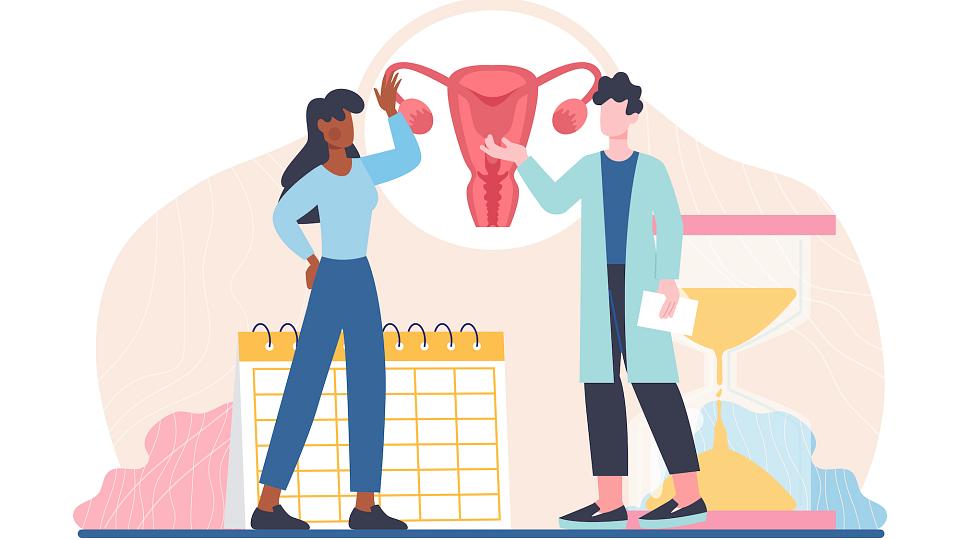
How to Battle the Bulge During Menopause
You're eating a healthy, balanced diet and hitting the gym every night, yet the needle on the scale keeps creeping up. What's going on here? What’s with all this belly fat?
If you're over age 40 and this scenario sounds familiar, you're most likely entering perimenopause, the onset of menopause. Before you toss out your favorite pair of jeans, know that not all hope is lost. With some lifestyle changes, you can get your weight back on track and even boost your overall health.
“This is a transformative stage in your life when you can focus more on yourself,” says Camille Moreno, DO, MSCP, medical director of the Midlife Women's Health and Menopausal Medicine Program at University of Utah Health. “It can be hard because, physiologically, the body is changing, but you can look at it with a positive mindset and the belief that you can still live your best life.”
How Does Menopause Cause Weight Gain?
Decreasing hormones, genetics, and aging in general all contribute to midlife weight gain. Here are some bodily changes you can expect during “the change”:
- Loss of muscle mass: Estrogen plays a key role in building our muscles and maintaining lean body mass. When estrogen declines, so does muscle mass. This contributes to a slower metabolism, making it more challenging to lose weight.
- Decreased energy: Changing hormone levels can take a toll on your energy. Hot flashes, night sweats, insomnia, and other menopausal symptoms can cause a vicious cycle of fatigue and weight gain.
- Increased belly fat: The drop in estrogen makes it more likely to gain weight around the belly. This region of fat, also known as subcutaneous fat, can cause a host of health issues including diabetes, heart disease, and stroke.
How Can I Lose This Stubborn Weight?
Nothing is more frustrating than knowing the aging process is causing your waistline to expand. However, you can still lose the extra weight and keep it off by making these lifestyle changes:
- Exercise daily: Aim for at least 30 minutes of moderate exercise every day. Choose an activity you most enjoy and stick with it. Whether you prefer walking around the neighborhood, doing Pilates, or training for a marathon, just get moving.
- Create a healthy sleep routine: Menopause can wreak havoc on your sleep, leading to stress and low energy—all contributing factors to weight gain. Practice good sleep hygiene and get on a treatment plan if night sweats keep you awake.
- Eat a heart-healthy diet: Restrictive diets and social media influencers won’t help you in the long run. The key to sustainable weight loss is lifestyle change. Focus on a balanced diet rich in fruits, veggies, whole grains, and lean protein.
- Unwind your mind: Research has shown a correlation between stress and weight gain. That’s why it’s important to take time for yourself by practicing relaxation techniques and indulging in calming activities that bring you joy.
How Can I Stick with These Healthy Habits?
Making healthy lifestyle changes can be easier said than done. The key is to give yourself grace when you fall off track and carve in some “me time” every day. This can be done by scheduling exercise and other self-care activities into your calendar.
“Scheduling time for self-care in your busy day can make those healthy lifestyle changes stick,” Moreno says. “I work in a demanding job, but I manage to do my morning long runs by waking up early and jumping on the treadmill. It can be hard getting up so early, but I always feel so much better after a workout.”
When it comes to building good habits, it’s all about baby steps. Try not to do too much all at once and give yourself some grace when you fall off track.
“We can't always be 100% perfect, so give yourself some compassion and grace during this time when you're going through so many physical and emotional changes.”
What Are My Next Steps?
Let’s face it. Aging and the hormonal roller coaster of menopause can be rough. However, lifestyle changes and medical treatment can certainly help. If you’re not sure where to start, online resources can help you find the right menopause doctor.
“Menopause is having a movement right now,” Moreno says. “More people are talking about it, and women have many different options for treating their midlife symptoms. There's no reason to suffer through this alone.”
Learn More From Our Specialists
The Science Behind Hot Flashes in Women and How to Cope
Hot flashes are a signature symptom of menopause, but for some women, they last far longer than expected—sometimes up to 15 years. What causes them, and why do they vary so much from person to person? Learn about the treatment options and when to seek help.





